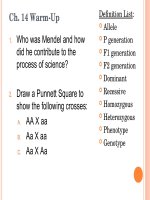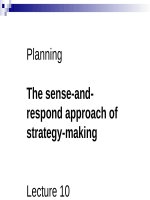Lecture Exploring management - Chap 14: Teams and teamwork
Bạn đang xem bản rút gọn của tài liệu. Xem và tải ngay bản đầy đủ của tài liệu tại đây (1.37 MB, 33 trang )
Exploring Management
Chapter 14
Teams and
Teamwork
Chapter 14
•
•
•
Why is it important to understand teams
and teamwork?
What are the building blocks of successful
teamwork?
How can managers create and lead highperformance teams?
14.1
Teams and Teamwork
•
•
•
Teams offer synergy and other benefits to
organizations and their members
Teams often suffer from common
performance problems
Organizations are networks of formal
teams and informal groups
14.1 CONTINUED
Teams and Teamwork
•
•
•
Organizations use committees, task
forces, and cross functional teams
Virtual teams are increasingly common in
organizations
Self-managing teams are a form of job
enrichment for groups
TEAMS AND TEAMWORK
Teamwork Benefits
•
Team
–
collection of people with complementary skills
who work together to accomplish shared
goals while holding each other mutually
accountable for performance results
TEAMS AND TEAMWORK
Teamwork Benefits
•
Synergy
–
The creation of a whole that exceeds the sum
of its parts
TEAMS AND TEAMWORK
Teamwork Problems
•
Social loafing
–
The tendency of some people to avoid
responsibility by free-riding in groups
–
To prevent social loafing
•
•
Keep groups small
Make task assignments
interesting
TEAMS AND TEAMWORK
Teamwork Problems
•
More teamwork performance problems
–
Personality conflicts
–
Differences in work styles
–
Competing goal and visions
–
Overly ambitious agendas
–
Poorly defined problems
–
Conflicts with other work deadlines or
personal priorities
–
Bad experiences with teams in the past
TEAMS AND TEAMWORK
Formal and Informal
•
Formal teams
–
Officially recognized and supported by the
organization
•
Department
•
Work units
•
Teams
•
Divisions
TEAMS AND TEAMWORK
Formal and Informal
•
Informal groups
–
Grow spontaneously from co-worker
relationships
•
Interest groups
•
Friendship groups
•
Support groups
TEAMS AND TEAMWORK
Types of Teams
TEAMS AND TEAMWORK
Types of Teams
•
Virtual teams
–
Use technology to work together from different
locations
TEAMS AND TEAMWORK
Types of Teams
•
Self-managing teams
–
Have authority to make decisions about how
they share and complete work
14.2
Successful Teamwork
•
•
•
Teams need the right members and inputs
to be effective
Teams need the right processes to be
effective
Teams move through different stages of
development
14.2 CONTINUED
Successful Teamwork
•
•
•
Team performance is affected by norms
and cohesiveness
Team performance is affected by task and
maintenance roles
Team performance is affected by
communication networks
SUCCESSFUL TEAMWORK
Effective Teams
•
Effective teams have three output goals
–
Task performance
–
Member satisfaction
–
Team viability
SUCCESSFUL TEAMWORK
Effective Teams
SUCCESSFUL TEAMWORK
Effective Teams
•
Membership composition
–
•
Mix of abilities, skills, backgrounds and
experiences of the members
Diverse teams
–
Generally more effective
SUCCESSFUL TEAMWORK
Effective Teams
•
•
Inputs that affect team performance
–
Team size
–
Nature of the task
–
Organizational setting
Team process
–
The way members
work together
SUCCESSFUL TEAMWORK
Team Development
•
Stages of team development
SUCCESSFUL TEAMWORK
Performance
•
Performance is affected by norms and
cohesiveness
–
Norms
•
–
Expected behaviors
Cohesiveness
•
How committed team
members are
SUCCESSFUL TEAMWORK
Performance
SUCCESSFUL TEAMWORK
Roles
•
Team performance is affected by task and
maintenance roles
–
Task activities contribute directly to the team’s
purpose
–
Maintenance activities support the emotional
aspects of the team as a social system
SUCCESSFUL TEAMWORK
Roles
•
Distributed leadership
–
•
All members are responsible for recognizing
when task or maintenance activities are
necessary
Disruptive behaviors cause
problems
–
–
–
Excessive joking
Aggressiveness
Non-participation
SUCCESSFUL TEAMWORK
Communication
•
Team performance is affected by use of
communication networks
–
Decentralized
•
–
Centralized
•
–
All members communicate directly
Requires members to communicate through a
central hub or center point
Restricted
•
Subgroups fail to communicate well, become
antagonistic and restrict communication









